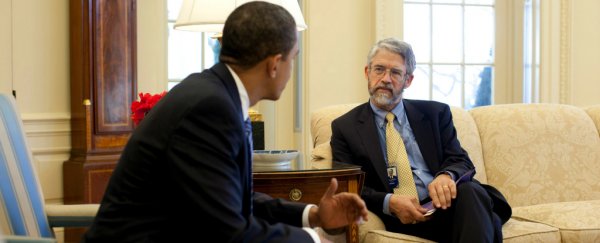It's well over a year into his presidency, and Donald Trump still has very little scientific guidance.
Not only has Trump taken longer than any modern president to appoint a chief science advisor, he has also left the Office of Science and Technology Policy (OSTP) unusually understaffed and without proper leadership.
These were just a few of the many critiques given by former President Barack Obama's chief science advisor, John Holdren, in a recent interview with The Asahi Shimbun.
During the interview, Holdren left nothing back, tearing apart President Trump's dangerous disregard for science, and his lack of any science policy to speak of.
In his time as chief science advisor, Holdren said he visited Obama about twice a week, and some weeks he saw the president five or six times. In his position, Holdren also led the OSTP, which informs science and technology policy and practice at the White House.
Yet in the past year, the OSTP has shrunk from 135 people under the Obama administration to just 45 or 50 employees under the Trump administration.
Without a chief science advisor to head the OSTP, Holdren said the office is languishing.
"The result is that the recommendations to the president about science and technology budgets are being made by people who don't have any particular background in science and technology," Holdren told The Asahi Shimbun.
The effects of this have already been seen in the Trump administration's proposed 2019 budget, which would have slashed funding to the National Oceanic and Atmospheric Administration (NOAA), the US Geological Survey (USGS), and the Environmental Protection Agency (EPA).
But it's not just science budgets that have been affected. The lack of science and technology advice undermines nearly every facet of evidence-based policymaking in the White House.
Right now, Holdren argues, nobody in the Trump administration knows who to go to when they have a question about policy issues where science might play a role.
"And so you have to assume that the policy-making process in the White House is basically deprived of both insights about opportunities that science and technology may present for the economic agenda, the public health agenda, the national security agenda, the energy and climate agenda, the environment agenda, concluded Holdren.
Holdren said that even though he no longer works for the government, he's still in contact with several government employees - several of whom are discouraged by the recent changes. But while things are certainly different at the OSTP, Holdren said employees at the EPA and the Department of Interior (DOI) are suffering the most.
"I would say, first of all, the place with the lowest morale is the EPA. I mean people are really demoralized in the EPA," he said.
"People are pretty demoralized in the Department of Interior, below the level of a political appointee, below the level of the people who Trump has appointed. The scientists are continuing to leave."
When asked why any of this matters, Holdren used President Trump's handling of North Korea as an example of how dangerous things can get.
"We have missiles that can knock out a missile in the air 97 percent of the time, and if you can send two of them, it's going to get knocked down," President Trump said in an interview with Sean Hannity on Fox News last year.
The statement is significant not because it signals rising tensions with North Korea's Kim Jong Un, but rather because it is entirely incorrect. Holdren argues this is exactly why President Trump so desperately needs a chief science advisor.
"It's a good idea that the president should understand that we would be fortunate to shoot down, let us say, 50 percent of the missiles coming our way," he said.
A good idea, or a matter of national security. Because if President Trump actually thinks this is how our missile defense system works, he might be more willing to start a war with North Korea.
Still, even if President Trump appointed a chief science advisor tomorrow, there is no assurance that he will actually heed their advice.
Holdren pointed out that when it came to the Paris accord, the President had no problem rejecting the advice of his most senior and experienced Cabinet members.
"Now, he was advised by James Mattis, his secretary of defense, to stay in. He was advised by Rex Tillerson, his secretary of state, to stay in. He was advised by 600 CEOs of American corporations that it was in the interest of US business that he stay in, and he got out," said Holdren.
Holdren said he can't be sure exactly why Trump does not yet have a science advisor, but he has a pretty good theory.
"I would speculate that some of the people he might ask would be concerned that if they took the job, he would not be listening because he has not shown any indication that he listens very much and particularly not to relevant facts from science and technology," he said.
Holdren finished the interview with a word of advice for concerned scientists going forward: keep communicating.
"Scientists in whatever field need to get better at explaining to policy makers and voters certainly, but also kids who ultimately will be voters and will affect policy," he said.
"If they're the only group that silence themselves in the political arena on the grounds that it's bad to mix science and politics, then politics will be the poorer for it," he added.
Science AF is ScienceAlert's new editorial section where we explore society's most complex problems using science, sanity and humor.
